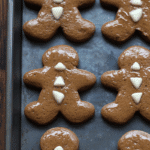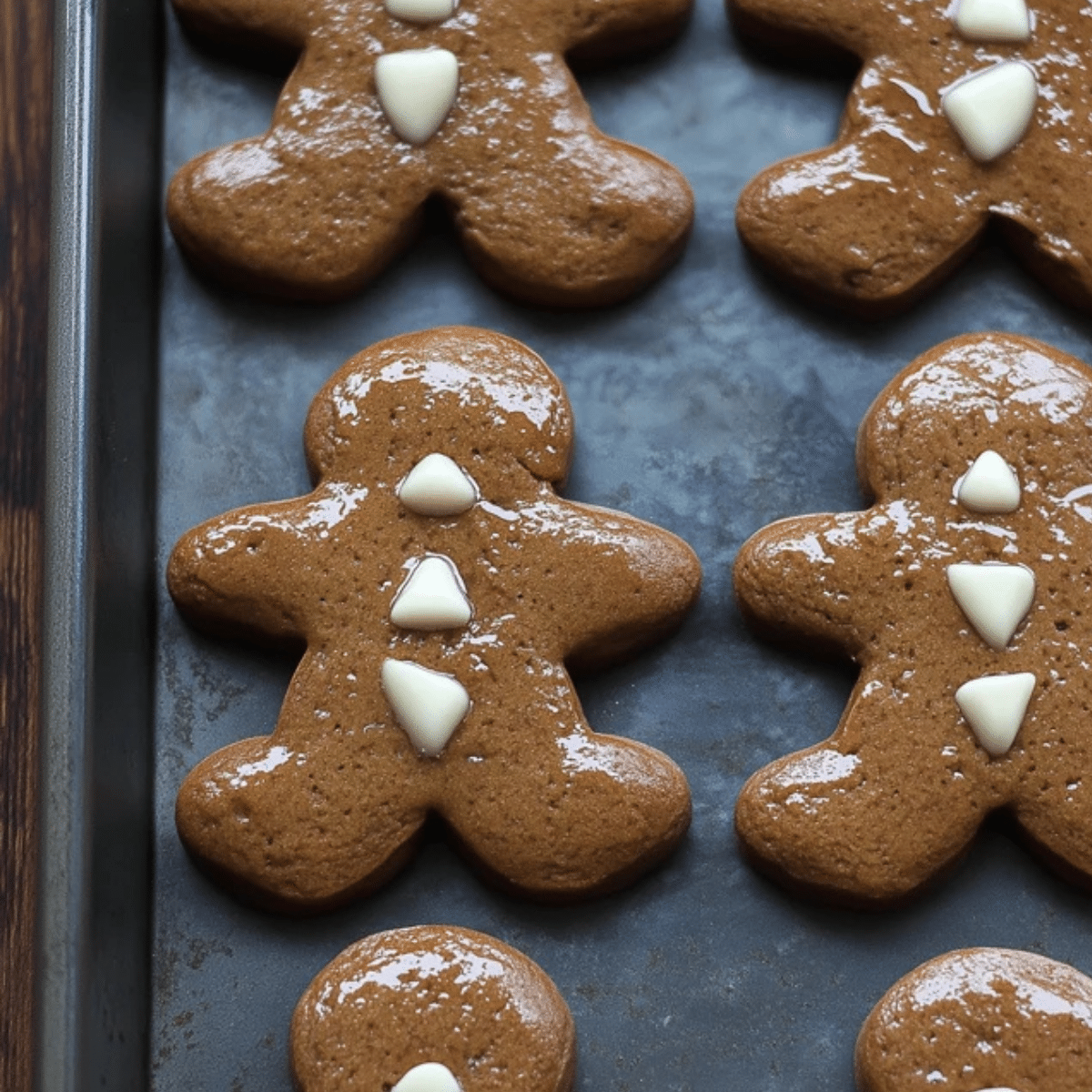Soft, spiced, and wonderfully festive, German Gingerbread Cookies — known as Lebkuchen — are the heart of many European Christmas traditions. With their rich spice blend and tender texture, these cookies stand apart from typical gingerbread cutouts. Coated with a glossy egg wash or sweet glaze, German Gingerbread Cookies deliver deep flavor, holiday nostalgia, and a beautiful sheen that makes them irresistible on every holiday platter.
Table of Contents
Why These German Gingerbread Cookies Are So Special
Traditional yet unique, German Gingerbread Cookies are known for their incredibly soft bite and complex flavor profile. Unlike regular gingerbread, lebkuchen is infused with warming spices like cinnamon, ginger, and cloves, creating a richly aromatic dough. These cookies are:
- Soft and Chewy: A cooked dough base creates a unique, tender texture.
- Deeply Spiced: Classic German spice blends give an intense, nostalgic flavor.
- Shiny and Elegant: Finished with an egg wash or sugar glaze for visual appeal and moisture retention.
- Customizable: Shape them into circles, stars, or gingerbread men, and decorate as desired.
Whether you’re building holiday gift boxes or looking for a European-inspired cookie to round out your seasonal baking, German Gingerbread Cookies are a must-try.
What You’ll Need: Key Ingredients and Their Roles
- Brown Sugar: Adds caramel-like sweetness and moisture
- Milk: Softens the dough and adds creaminess
- Water: Helps dissolve the sugar and balances the texture
- Butter: Provides richness and depth of flavor
- All-Purpose Flour: Forms the base structure of the cookie
- Gingerbread Spice Mix: Signature blend of cinnamon, cloves, ginger, and more for authentic flavor
- Salt: Enhances the spices and balances sweetness
- Baking Soda: Gives the cookies lift and softness
- Egg White: Lightens the dough and binds it
- Liquor (Vodka, Brandy, Rum): Adds moisture and subtle flavor depth
- Egg Yolks + Water (for Egg Wash): Creates a glossy, moisture-locking finish
- Nuts or Seeds (optional): Decorative topping with texture and nutty flavor
Ingredient Swaps and Dietary Options
- Flour: Use a 1:1 gluten-free flour blend to make gluten-free lebkuchen
- Dairy-Free: Substitute butter with plant-based margarine and use a dairy-free milk
- Sugar Substitute: Replace brown sugar with coconut sugar for a lower glycemic option
- Alcohol-Free: Use fruit juice or a splash of vanilla extract instead of liquor
- Nut-Free: Omit nut toppings or use seeds like pumpkin or sunflower for decoration
These swaps allow you to enjoy the essence of German Gingerbread Cookies while meeting various dietary needs.
How to Make German Gingerbread Cookies from Scratch
- Create the Dough Base
In a medium saucepan, combine brown sugar, milk, water, and butter. Heat until the butter melts and the sugar fully dissolves. Remove from heat just before boiling. - Add Dry Ingredients
Stir in flour, gingerbread spice mix, and salt with a sturdy spoon. Return the pot to medium heat and cook the dough for a few minutes until it thickens and pulls away from the sides. - Cool the Dough
Set the dough aside to cool until it’s no longer hot but still pliable. This step prevents the egg white from cooking prematurely. - Incorporate Airy Lightness
Beat the egg white until stiff peaks form. Fold it into the cooled dough along with baking soda and your chosen liquor until fully incorporated and slightly fluffy. - Chill and Roll
Divide the dough into four parts, roll each between parchment paper to ¼ inch thickness, and chill thoroughly in the fridge or freezer. - Cut and Shape
Dust your workspace with flour. Roll the dough to ⅛ inch thickness and cut into desired shapes. Dip cookie cutters in flour to prevent sticking. Decorate with nuts or seeds if desired. - Bake to Perfection
Place cookies on a baking sheet and bake at 350°F for about 15 minutes. The tops should be opaque, and the bottoms lightly browned. - Brush with Egg Wash
Immediately after baking, brush cookies with a mix of egg yolks and water for a shiny, classic finish. This locks in moisture and enhances shelf life.
Expert Tips for the Perfect Lebkuchen
- Don’t skip chilling: Chilled dough is easier to roll and cut, especially since it’s sticky.
- Cook the dough base properly: This technique, similar to choux pastry, gives lebkuchen its characteristic softness.
- Use a light hand with the egg white: Overmixing can deflate the dough and toughen the cookies.
- Store right: Keep cookies in an airtight container to maintain moisture. Freeze extras for longer storage.
These small steps make a huge difference in texture and flavor.
Serving Suggestions and Flavor Twists
- Pair with: Hot mulled wine, apple cider, or spiced tea for a festive pairing
- Drizzle with Chocolate: For added indulgence, dip half the cookie in dark chocolate
- Add Citrus Zest: Enhance brightness by adding orange or lemon zest to the dough
- Decorate Creatively: Use candied peel, sprinkles, or edible gold dust for visual flair
- Make Ahead: The dough can be made and chilled up to 2 days in advance
German Gingerbread Cookies also hold up beautifully in gift boxes and cookie exchanges, thanks to their shelf-stable nature.
The Heritage Behind German Gingerbread Cookies
Lebkuchen is more than just a cookie—it’s a tradition passed down through generations. With origins in regions like Volynia and centuries of festive history, these German Gingerbread Cookies bring both flavor and heritage to the holiday season. Their soft texture, spiced aroma, and glossy finish make them a standout in any cookie spread.
Whether you’re baking with family or starting a new tradition, this recipe connects you to a timeless European celebration—one delicious bite at a time.
Conclusion
German Gingerbread Cookies, or Lebkuchen, are more than a holiday treat — they’re a bite of history, tradition, and irresistible flavor. With their tender texture, aromatic spice blend, and signature glossy finish, these cookies stand out on any holiday dessert table. Whether you stick to the original recipe or explore the suggested variations, one thing’s certain: these German Gingerbread Cookies will become a beloved part of your festive baking lineup. They store beautifully, freeze well, and offer that perfect blend of nostalgia and indulgence — a true hallmark of the holiday season.
Frequently Asked Questions About German Gingerbread Cookies
How are German Gingerbread Cookies different from regular gingerbread?
German Gingerbread Cookies, also known as Lebkuchen, are much softer and more cake-like than traditional crisp gingerbread cutouts. They use a complex spice blend and are finished with an egg wash or glaze, giving them a glossy, bakery-style finish. The dough is cooked before baking, which also contributes to their unique texture.
Can I make German Gingerbread Cookies without alcohol?
Absolutely. While traditional recipes use vodka, brandy, or rum to enhance flavor and soften the dough, you can replace the alcohol with fruit juice (like apple or orange) or even a bit of brewed tea. These alternatives still keep the dough moist and flavorful without the use of alcohol.
How long do German Gingerbread Cookies stay fresh?
When stored in an airtight container at room temperature, German Gingerbread Cookies stay soft and fresh for up to 2 weeks. For longer storage, you can freeze them in sealed containers for up to 3 months. The egg wash or sugar glaze helps retain their moisture and texture over time.
More Relevant Recipes
- Pumpkin Snickerdoodles – Fall Cookie Recipe: These soft and chewy cookies are coated in cinnamon sugar, offering a spiced sweetness that complements the flavor profile of German Gingerbread Cookies. A seasonal favorite with a cozy texture and warm spice.
- Cardamom Crumb Cake – Delicious Recipe: Featuring warm cardamom spice and a soft crumb texture, this cake delivers a depth of flavor that pairs beautifully with the spice notes in lebkuchen. Ideal for afternoon tea or a festive breakfast.
- Cinnamon Roll Cheesecake – Irresistible Dessert: This indulgent dessert combines cinnamon warmth with a creamy cheesecake base, making it a rich and spiced companion to German Gingerbread Cookies. Perfect for holiday dessert spreads.

German Gingerbread Cookies
- Total Time: 45 minutes
- Yield: 40 cookies
- Diet: Vegetarian
Description
Soft, spiced, and glazed German Gingerbread Cookies (Lebkuchen) made from a traditional recipe using a cooked dough, warm spices, and a glossy egg wash finish. Perfect for the holidays and full of nostalgic flavor.
Ingredients
- 1 ⅔ cups brown sugar
- ⅔ cup milk
- ½ cup water
- ½ cup butter
- 3 ⅓ cups all-purpose flour
- 1 tablespoon gingerbread spice mix (or a mix of ground cinnamon, ginger, and cloves)
- ½ teaspoon salt
- ¾ teaspoon baking soda
- 1 egg white
- 2 ½ tablespoons liquor (brandy, rum, or vodka)
- Nuts and seeds (for decoration, optional)
- 2 egg yolks (for egg wash)
- 1 tablespoon water (for egg wash)
Instructions
- In a saucepan, heat brown sugar, milk, water, and butter over medium heat until butter melts and sugar dissolves. Remove from heat just as the mixture begins to boil.
- Stir in the flour, gingerbread spice mix, and salt. Mix well with a wooden spoon until combined.
- Return the pot to the stove and continue stirring and heating until the dough thickens and pulls away from the sides of the pan.
- Remove the dough from heat and allow it to cool until it is no longer hot but still pliable.
- In a separate bowl, beat the egg white until stiff peaks form.
- Once dough is cool, stir in the beaten egg white, baking soda, and liquor until fully incorporated.
- Divide the dough into 4 parts and roll each between parchment paper to about 1/4 inch thick. Chill the rolled dough in the fridge or freezer until firm.
- Preheat oven to 350°F (175°C). Prepare baking sheets.
- Roll chilled dough to about 1/8 inch thick, cut into desired shapes, and place on baking sheets. Decorate with nuts or seeds if desired.
- Bake for approximately 15 minutes or until tops are opaque and bottoms are lightly golden.
- Whisk together egg yolks and water for egg wash.
- Brush hot cookies immediately with a thin layer of egg wash for a glossy finish.
- Cool completely on a wire rack and store in an airtight container.
Notes
- To avoid cooking the egg white, make sure the dough is only warm, not hot.
- You can substitute the egg wash with a powdered sugar glaze (¾ cup powdered sugar + 1.5 tablespoons water).
- Use flour-dusted cookie cutters to prevent sticking.
- Cookies can be frozen in airtight containers for long-term storage.
- Prep Time: 30 minutes
- Cook Time: 15 minutes
- Category: Dessert
- Method: Baking
- Cuisine: German
Nutrition
- Serving Size: 1 cookie
- Calories: 102
- Sugar: 9g
- Sodium: 55mg
- Fat: 4g
- Saturated Fat: 2.5g
- Unsaturated Fat: 1.5g
- Trans Fat: 0g
- Carbohydrates: 15g
- Fiber: 0.5g
- Protein: 1g
- Cholesterol: 12mg

